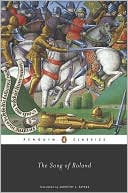

 |

|

The average rating for The Song of Roland based on 2 reviews is 3 stars.
Review # 1 was written on 2009-03-09 00:00:00 Ty Nixon Ty NixonIt's not surprising that this work's greatest descendants are satires. It's often difficult to take the simplistic pro-crusade sentiment seriously. Each time one of the Knights yelled to some dead Muslim "We're right, you're wrong!" I laughed. When you're debate opponent is already slain, I guess you don't need to say anything else. Ariosto drew on this tradition for his Orlando Furioso , but each time a knight yells at Muslims in that book, the Muslims yell the same thing back. Though the Furioso is decidedly on the side of the crusaders (they win, after all), it reads like a Mad Magazine parody of 'The Song of Roland'. Ariosto clearly has a sense that both sides are fighting for the same reasons (not that he's unhappy to be on the winning side). Cervantes likewise made a parody of this work with his 'Don Quixote', by simply asking 'what if a man comported himself like a knight while making his way through the real world'. Consequently, Quixote spends the book yelling at people he thinks are wrong and trying to kill them. Apparently, its only a comedy if you don't succeed. The unspoken critique throughout the book is that if Quixote is behaving inappropriately for real life, then the knights of Roland are only appropriate for a pretend world. The Muslims have all the motivation of a Disney villain, desiring only to be treacherous and mean. The philosophical complexity is a long fall from Homer or Virgil. The work provides us with the clear sense that neither the author nor his culture have any real understanding of their foes, presenting the Muslims as worshiping Mohammad, Apollo, and popularizing the figure of 'Termagant'--long after referenced as the primary god of the Muslims. I found an interesting article which translated some of the terms in the book to Arabic, including 'olyphant' and the names of several horses and swords. According the the article, 'Apollo' and 'Termagant' are mis-translations of important religious figures; namely, Mohammad's uncle and son. They are no more gods than Moses, Solomon, or the Pope. I had to find another article to explain the meaning of one passage describing a knights impressive physical traits and ending with "he had a large crotch". Apparently this is meant to signify the length of his thighs, and not anything particularly sexual. I guess long thighs just made you a bad dude back then (which does make sense if the primary war skill is equestrianism). The bumbling, mustache-twirling Muslims set a standard for unsophisticated villains to come, appealing to the lowest common denominator. This is hardly surprising, since the work was performed for the public by singing jongleurs. Like the Passion Plays, the work was half entertainment, half political propaganda meant to stir up discontent in the illiterate, uneducated man. In fact, the original battle described, in which Roland made his final stand, did not involve any Muslims at all--it was between Charlemagne's Christian French and Spanish Basques whose lands they were invading, who were also Christians. The whole anti-Muslim angle was tacked on later, just to rile people up. There are some passages where Muslims are described as mighty, attractive, and clever, but these passages do not exactly typify their portrayal in the work. Between the maniacal villains and the high death counts, this book clearly makes up a prototype for action movies to come, complete with the pithy lines delivered by the heroes to fresh corpses. In that sense, it's not hard to imagine the popularity of Roland, who was the John McClane of his time. Despite historical and cultural significance and a few moving descriptions, the work is overall rather childish, falling long after the height of the Roman authors, yet still remote from the coming Renaissance. European culture at the time was light on philosophy, but had a multitude of enemies and wars. Ironically, it was the Muslims who were currently at a philosophical and intellectual peak, translating and maintaining the Greek tradition. The Muslims had developed 'zero' three hundred years before, and in another three hundred, Ibn Khaldun would invent the social sciences in one fell swoop. It was only during the Crusades that Europeans began to learn things like mathematics and Greek philosophy from the Muslims, bringing these ideas back home and sparking off the Renaissance. The Song is certainly useful for any follower of the epic tradition or for historians, and is quite short, but overall it is merely a placeholder between great works of earlier and later periods. I read the Glyn Burgess translation, which is passable and has thoughtful footnotes. |
Review # 2 was written on 2011-06-15 00:00:00 Pankrati Pankrati Pankrati PankratiBloodthirsty. Historical clash between Charlemagne's rear guard and rapacious Basques transformed into a medieval epic of betrayal, loyalty and duty against a backdrop of warfare between Muslim Spain and Christian France. Hugely influential - causing the name Ganelon, here associated with the blackest treachery, to drop out of documented usage as a given name! Demonstrating that the power of literature to change society was already nascent evn at the dawn of the Middle Ages. |
CAN'T FIND WHAT YOU'RE LOOKING FOR? CLICK HERE!!!